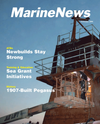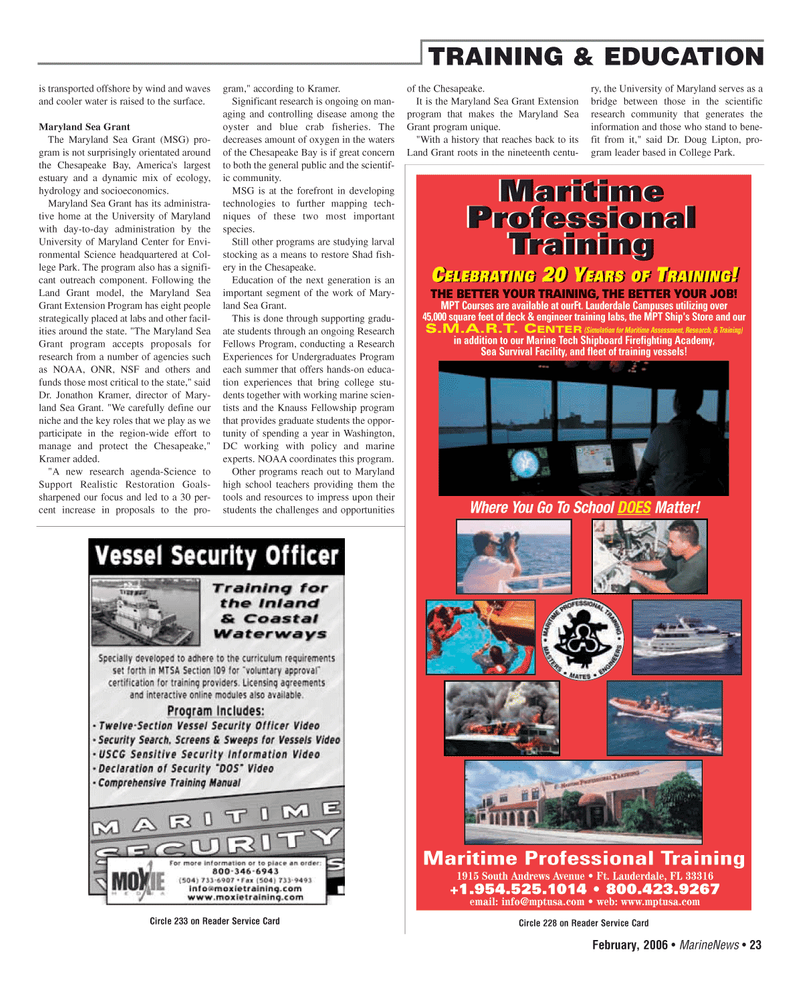
Page 23: of Marine News Magazine (February 2006)
The Training & Education Edition
Read this page in Pdf, Flash or Html5 edition of February 2006 Marine News Magazine
February, 2006 • MarineNews 23 is transported offshore by wind and waves and cooler water is raised to the surface.
Maryland Sea Grant
The Maryland Sea Grant (MSG) pro- gram is not surprisingly orientated around the Chesapeake Bay, America's largest estuary and a dynamic mix of ecology, hydrology and socioeconomics.
Maryland Sea Grant has its administra- tive home at the University of Maryland with day-to-day administration by the
University of Maryland Center for Envi- ronmental Science headquartered at Col- lege Park. The program also has a signifi- cant outreach component. Following the
Land Grant model, the Maryland Sea
Grant Extension Program has eight people strategically placed at labs and other facil- ities around the state. "The Maryland Sea
Grant program accepts proposals for research from a number of agencies such as NOAA, ONR, NSF and others and funds those most critical to the state," said
Dr. Jonathon Kramer, director of Mary- land Sea Grant. "We carefully define our niche and the key roles that we play as we participate in the region-wide effort to manage and protect the Chesapeake,"
Kramer added. "A new research agenda-Science to
Support Realistic Restoration Goals- sharpened our focus and led to a 30 per- cent increase in proposals to the pro- gram," according to Kramer.
Significant research is ongoing on man- aging and controlling disease among the oyster and blue crab fisheries. The decreases amount of oxygen in the waters of the Chesapeake Bay is if great concern to both the general public and the scientif- ic community.
MSG is at the forefront in developing technologies to further mapping tech- niques of these two most important species.
Still other programs are studying larval stocking as a means to restore Shad fish- ery in the Chesapeake.
Education of the next generation is an important segment of the work of Mary- land Sea Grant.
This is done through supporting gradu- ate students through an ongoing Research
Fellows Program, conducting a Research
Experiences for Undergraduates Program each summer that offers hands-on educa- tion experiences that bring college stu- dents together with working marine scien- tists and the Knauss Fellowship program that provides graduate students the oppor- tunity of spending a year in Washington,
DC working with policy and marine experts. NOAA coordinates this program.
Other programs reach out to Maryland high school teachers providing them the tools and resources to impress upon their students the challenges and opportunities of the Chesapeake.
It is the Maryland Sea Grant Extension program that makes the Maryland Sea
Grant program unique. "With a history that reaches back to its
Land Grant roots in the nineteenth centu- ry, the University of Maryland serves as a bridge between those in the scientific research community that generates the information and those who stand to bene- fit from it," said Dr. Doug Lipton, pro- gram leader based in College Park.
TRAINING & EDUCATION
Maritime
Professional
Training
Maritime Professional Training 1915 South Andrews Avenue • Ft. Lauderdale, FL 33316 +1.954.525.1014 • 800.423.9267 email: [email protected] • web: www.mptusa.com
Where You Go To School DOES Matter!
THE BETTER YOUR TRAINING, THE BETTER YOUR JOB!
MPT Courses are available at ourFt. Lauderdale Campuses utilizing over 45,000 square feet of deck & engineer training labs, the MPT Ship's Store and our
S.M.A.R.T. CENTER (Simulation for Maritime Assessment, Research, & Training) in addition to our Marine Tech Shipboard Firefighting Academy,
Sea Survival Facility, and fleet of training vessels!
CELEBRATING 20 YEARS OF TRAINING!
Circle 228 on Reader Service Card
Circle 233 on Reader Service Card
FEBRUARY MN2006 3(17-24).qxd 2/3/2006 5:23 PM Page 23

 22
22

 24
24
